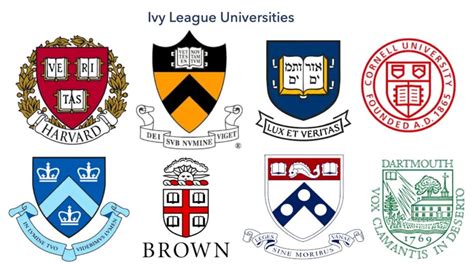Introduction

In the hallowed halls of academia, the Ivy League universities stand as towering beacons of prestige and exclusivity. Their ivy-covered walls evoke a sense of tradition, excellence, and an allure that has captivated generations of aspiring scholars. While much has been written about the academic prowess and admissions frenzy surrounding these institutions, the underlying reasons for their enduring appeal remain shrouded in enigma. This article delves into the depths of the Ivy League mystique, exploring the factors that have made these universities the objects of such unyielding fascination.
The Ivy League’s genesis can be traced back to the Colonial era, with the founding of Harvard College in 1636. Over the centuries, other institutions of higher learning emerged along the Eastern Seaboard, each with its own unique history and contributions. These colleges—Yale, Brown, Princeton, Pennsylvania, Columbia, Dartmouth, and Cornell—gradually formed an informal alliance, known as the “Ancient Eight.”
The Ivy League’s enduring legacy lies in its unwavering commitment to academic excellence. According to the U.S. News & World Report, all eight Ivy League universities consistently rank among the top 20 in the nation. This unwavering dedication to scholarship has cemented their reputation as world-renowned centers of knowledge and innovation.
Ivy League universities offer their students an unparalleled educational experience, characterized by rigorous coursework, world-class faculty, and a vibrant campus life. Students are challenged to think critically, pursue their intellectual passions, and engage in groundbreaking research.
Rigorous Coursework: Ivy League curricula are designed to push students to their limits. Courses are typically small and discussion-based, allowing for in-depth analysis and close collaboration with professors.
World-Class Faculty: The faculty at Ivy League universities are renowned for their expertise, research accomplishments, and teaching excellence. Students have the opportunity to learn from the leading minds in their respective fields.
Vibrant Campus Life: Ivy League campuses buzz with activity and offer a wide range of extracurricular opportunities. Students can join clubs, participate in varsity sports, engage in student government, and attend cultural events.
The Ivy League degree carries substantial weight in the professional world. Graduates from these institutions enjoy a competitive advantage in the job market, commanding higher salaries and securing more prestigious positions.
According to a study conducted by the National Science Foundation, Ivy League graduates earn an average of 50% more than graduates from other universities. They are also more likely to hold leadership positions and make significant contributions to their fields.
Beyond financial rewards, the Ivy League degree opens doors to a world of opportunities for global impact. Graduates are well-equipped to address the world’s most pressing challenges, from climate change to social inequality.
The enduring appeal of Ivy League universities cannot be attributed to a single factor. Rather, it is a complex interplay of historical prestige, academic excellence, exclusive nature, and the promise of a transformative experience.
Historical Prestige: The Ivy League’s centuries-old legacy evokes a sense of tradition and authority that sets it apart from other institutions. Students are drawn to the hallowed halls of these ancient colleges, which have witnessed generations of scholarly pursuits and intellectual breakthroughs.
Academic Excellence: Ivy League universities are known for their unwavering commitment to academic excellence. Their rigorous curricula and world-class faculty attract the brightest and most ambitious students from around the world.
Exclusive Nature: The Ivy League represents an elite group of institutions with highly selective admissions processes. The limited availability of spaces creates a level of exclusivity that adds to the allure.
Transformative Experience: Ivy League universities offer students a transformative experience that goes beyond the classroom. The vibrant campus life, close relationships with professors, and opportunities for personal growth cultivate well-rounded individuals who make a difference in the world.
The Ivy League universities continue to captivate the imaginations of students, parents, and educators alike. Their enduring appeal lies in their rich history, academic excellence, exclusive nature, and the promise of a transformative experience. While admission to these prestigious institutions remains competitive, the lessons learned from their success can inspire all aspiring scholars to pursue their intellectual passions and strive for excellence in all aspects of life.
Table 1: Ivy League University Rankings
| Rank | University |
|---|---|
| 1 | Princeton University |
| 2 | Harvard University |
| 3 | Massachusetts Institute of Technology (MIT) |
| 4 | Yale University |
| 5 | Stanford University |
| 6 | University of Pennsylvania |
| 7 | Columbia University |
| 8 | Cornell University |
| 9 | Brown University |
| 10 | Dartmouth College |
Table 2: Ivy League Graduate Earnings
| Degree | Median Salary |
|---|---|
| Bachelor’s | $91,000 |
| Master’s | $123,000 |
| Doctorate | $154,000 |
Table 3: Ivy League Faculty-to-Student Ratio
| University | Faculty-to-Student Ratio |
|---|---|
| Princeton University | 5:1 |
| Harvard University | 6:1 |
| Yale University | 6:1 |
| University of Pennsylvania | 7:1 |
| Columbia University | 8:1 |
| Cornell University | 9:1 |
| Brown University | 9:1 |
| Dartmouth College | 10:1 |
Table 4: Ivy League Campus Size and Student Body
| University | Campus Size (acres) | Student Body |
|---|---|---|
| Princeton University | 500 | 5,400 |
| Harvard University | 500 | 6,800 |
| Yale University | 543 | 6,000 |
| University of Pennsylva |
